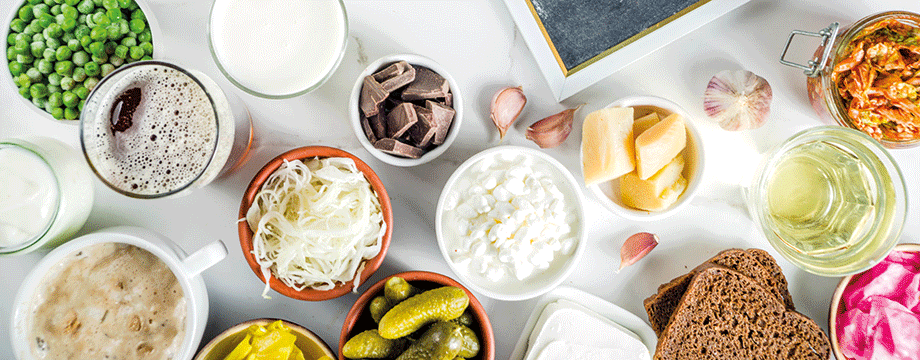Your winter bacteria buddies

Just what can probiotics and prebiotics do for your intestinal and overall health?
A healthy gut is now known to be linked to a healthy body, and keeping up a stock of healthy bacteria in the intestine is key to this. Probiotics play an important role in the gut’s immune system and the bacterial cells that line the gut wall. The benefits customers report to health stores of taking probiotics and prebiotics include better gut health and IBS support, an improvement in hay fever symptoms and recovery after antibiotic use.
Probiotics or prebiotics?
“Prebiotics are substances that encourage the growth of beneficial bacteria,” says Rob Whinnett of Blasta Wholefoods in Dungarvan, Co. Waterford. “Think of prebiotics as food for probiotics and the healthy bacteria in your system. Whereas probiotics are living microorganisms, prebiotics are non-living. Most prebiotics are carbohydrates that the human body cannot digest, but which make excellent food sources for beneficial bacteria. Probiotics are live microorganisms that can positively impact your health.”
“Prebiotics is really a fancy name for dietary fibre,” says Sian Eustace of Healing Harvest in Kinvara, Co Galway. “This provides food for the beneficial bacteria, allowing them to survive, multiply and flourish. Probiotics are beneficial bacteria which should inhabit the gut (sometimes referred to as ‘good’ or ‘friendly’ bacteria). Levels and strains of bacteria will wax and wane throughout our lives depending on a variety of factors and can be supported through dietary and lifestyle measures.”
The role of probiotics
“Your body contains billions of bacteria that help you stay healthy,” says Rob Whinnett. “The largest population of bacteria can be found in your intestines – known as the gut microbiome. These beneficial bacteria help you digest food and keep you healthy. If the community of bacteria in your intestines is disrupted, by say antibiotics, you may experience digestive difficulties and gastrointestinal symptoms. In order to re-establish healthy intestinal bacteria you can take probiotic or prebiotic supplements. People with IBS or inflammatory bowel conditions such as Crohns or Colitis often find that probiotics can help ease their symptoms.”
“I would recommend taking a stronger course of a probiotic, in supplement form, after taking an antibiotic, after a gastrointestinal bug or another situation, such as a period of intense stress which could impinge on the levels of beneficial bacteria in the gut,” says Sian Eustace.
Body benefits
“Probiotics are crucial for gut health and, since 70-80% of your immune cells are in your gut, probiotics play a huge part in keeping you healthy,” says Sian Eustace. “They are vital to keep food moving through the intestines. Many things in our lives and environments (e.g. stress, illness, medication, pollution, to name but a few) impact negatively on the levels of beneficial bacteria inhabiting our guts, therefore naturally probiotic foods such as dietary fibre are crucial for keeping them at optimum levels.”
“Probiotics and prebiotics have similar health benefits because they both accomplish the goal of increasing the population of healthy bacteria and yeast in your body,” says Rob Whinnett.”Healthy bacteria can form a protective shield in your digestive tract that prevents harmful bacteria and viruses from infecting your body. The presence of healthy bacteria can keep your immune system ‘primed’ and ready to respond to a threat. Probiotics and prebiotics are particularly useful in replenishing healthy bacteria communities after a disruption such as an infection or antibiotic use.”
How to take them
“You can find probiotics in fermented foods such as live yoghurts, sauerkraut, kimchi, kefir and kombucha,” says Rob Whinnett. “Prebiotic foods include chicory, garlic, leeks and onions. There are many probiotics supplements on the market, many of them becoming increasingly sophisticated and formulated to deal with particular problems like IBS or diarrhoea. Some probiotic supplements also contain prebiotics in order to help the probiotics thrive in your body.”
“There are several foods which contain beneficial bacteria – these are fermented foods such as yogurt, kefir, sauerkraut or kimchi,” says Sian Eustace. “Many of these foods are available in health food stores though you can make them yourself at home. Prebiotics are consumed every time you eat foods rich in dietary fibre, such as fruit and vegetables, grains or seeds. There are also many probiotic and prebiotic supplements on the market. These will contain different numbers of viable organisms as well as different cultures of bacteria.”
Choosing a probiotic
“It can be complicated to understand exactly what is in supplements,” says Sian Eustace. “Typically, you would be able to see how many live bacteria the product contains (usually a figure in the billions). You would also see a listing of the strains of bacteria. These would begin with l. for lactobacillus cultures and b. for bifidus cultures. A wide variety at high levels is something to aim for.”
“It’s not just about how many billion bacteria are in your supplement,” says Rob Whinnett. “Getting the right strains of bacteria is vital to ensure the good bacteria survive the journey through the stomach into the intestines where they can thrive. It can be confusing and staff in your local independent health store will be able to advise on the right probiotics for your particular needs.”
Quality over quantity
Society tends to enforce the idea that bigger is better, so you might assume that a bigger billion count means a better probiotic,” says nutritionist Naomi Osun who works with OptiBac Probiotics. “However, research shows this just isn’t the case. When it comes to probiotics, it’s more about quality over quantity. Whilst it’s important to get a probiotic with a count of at least 1 billion, as this is the minimum strength at which friendly bacteria can be beneficial in the body, it’s not essential to go for super-high billions because this isn’t always of any greater effect. Instead, focus more on choosing the right strains for you.”
More Rude Health articles...
Articles from our latest issue...